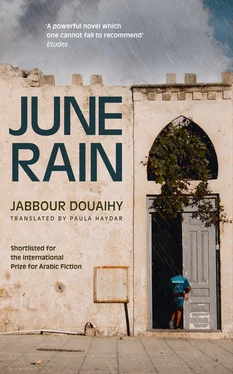Muhsin laughed at their heroics and encouraged them, but he knew deep down that their deeds weren’t going to make any difference in the battle. At any rate, Muhsin didn’t participate in sneak attacks or in ambushes along far-off roads.
Muhsin’s war had its rules, though no one knew from what source he extracted them; for every imaginable combat scenario he had an action and a decisive opinion about what to do. Don’t attack your adversary except when the sun is coming up, the time of deepest sleep. Don’t hit your enemy with just one bullet, because he might still have strategies to kill you. Whoever you are shooting, look them right in the eye…
Despite all that, he nearly killed Father Boulos, none other. After we begged and pleaded with him for a long time, Muhsin agreed to tell us about that incident once, though he avoided talking about his errors. He was amazed that he hadn’t shot him, and when he showed this astonishment of his we felt it would have been better for Muhsin’s reputation if the priest had actually been shot, even if it hadn’t been fatal. Father Boulos had tricked him that day.
The priest called out in a loud voice, announcing his presence whenever he crossed between the two quarters. He was the only one who could move between the two sides. He carried news and letters with him — news of those who died after being shot by the other side, those who died of natural causes, those of their relatives who were sick, and ‘Here’s a hundred liras from your aunt, because they told her you needed some money during these hard times,’ and ‘Tell your nephew to look after himself,’ and secret messages that stayed deep inside the ears into which he deposited them.
That day Father Boulos forgot to announce himself. He was deep in thought, worried. He was anxious and intent on going down to our quarter to inform those concerned that Syria had delivered a cannon ‘to them’, to the other side that is, and that they were assembling it and soon they would start shelling us, and it was impossible to hide from mortar fire. The moment Muhsin detected a shadow appearing around the corner he fired his rifle. Father Boulos was hit by shrapnel from the stone wall Muhsin hit with his bullet. Muhsin had dispassionately fired his rifle, and he didn’t appear very sorry when he realised his mistake, either.
It was true that his front was relatively quiet compared to others, but the six months he spent behind the millstone bore witness, in the middle of the month of July, to an infiltration attempt that forced Muhsin to request help to stop it. He was alert to the slightest movement coming from the opposing side. A dog or cat passing by would wake him up. If water trickled down from somewhere, or if he heard a sound, he’d double his attention for fear of some manoeuvre or ploy. He’d worked out exactly who the men standing guard in the opposing barricades were. He knew them by name and knew them by the sound of the bullets fired from each of their weapons, and by the way they fired their weapons, in a spray of fire or staccato shots. As soon as he heard a gun being fired he could name who’d fired it with total confidence.
During the remaining days, which were very long, Muhsin ‘committed himself’ to his post, as he liked to say, just as composure required a nosy woman who was going around the neighbourhood gossiping and spreading rumours to ‘commit herself’ to her own house. Muhsin didn’t show any signs of boredom. In fact, in his new seat behind the millstone, he appeared ready to stay there until God knows when. And Muhsin didn’t sleep. He worked while we nodded off out of boredom or left him, often to look for some excitement near the other barricades.
Muhsin laid out his plan the first day he took the millstone post, and he waited for exactly three and a half months for his opportunity. He aimed the barrel of his rifle towards the open space that whoever kept watch in the opposing barricade passed in front of, for one second when he entered his post and one second when he left it at the changing of the guards. It was a gap the size of a small window and Muhsin caught sight of them as they crossed quickly in front of it, like shadows flashing by. He waited for the day when one of his enemies would accidentally leave himself exposed even for a few seconds before going inside his barricade. That’s what he told us later on. And that’s what happened at exactly 12:30 on the 10th of August beneath the hot sun just before lunchtime: he fired one bullet from his long barrel rifle and hit his enemy right in the head. Earlier, Muhsin had called to one of us to go and tell Katrine not to bring his lunch that day because he wasn’t hungry. Then he hurried to add in response to what she might say, ‘Tell her I’m not sick…’
Muhsin then turned to us again and ordered us to pull back. His tone was final, which was what made us not obey completely, because we expected something to happen. We disappeared from his sight, but we could still see him. There remained only one mystery: how did he know that his enemy in the barricade in the old three-story building was going to leave himself exposed a few minutes later?
For the first time ever, Muhsin looked around before aiming his rifle. He rested his cheek on the rifle’s neck, hugged the rifle close and peered into the distance. That might have been the longest embrace we ever witnessed between Muhsin and his rifle, more than ten minutes long. Then all of a sudden, without any indication from his body or movement of his head, Muhsin fired a single bullet that pierced the silence encamped there on the front in the middle of that hot summer day. After Muhsin’s shot there wasn’t any response. On the contrary, the silence became more entrenched. A few minutes later we heard screams from a woman on the other side, and so the cries of joy rose up from our side and the bullets began to fall like a rainstorm.
Now, Kamileh thought, now she could relax. She locked the door and tossed the key up onto the roof. Yusef was dead and Kamileh was now living outside life. Strangely enough, it didn’t seem to her — in the beginning at least, during the weeks following the wake and the burial — that being widowed was going to be pure grief.
From now on, for example, she wouldn’t take a bath until she started to stink, or when Muntaha, the person most often by her side, said something. She wouldn’t change her underwear every day, either, and wouldn’t iron her hair or worry about going grey. And wearing black all the time relieved her from worrying about changing her dresses. Only the black stockings bothered her on those hot days, the way they tore her legs to pieces.
She was going to take a breather to a certain extent, the youngest of her parents’ children, the spoiled one who always got what she wanted. She threw off the weight of the world from her shoulders in one go. She would stop all the cooking and blowing on the fire, stop coring squash and removing hair from her legs, stop bearing pain and visiting doctors, especially gynaecologists. She wouldn’t be spreading her thighs for anyone; her body would retain its integrity, and the big battle wouldn’t have to be fought. Nothing would be wrenched from her and she wouldn’t have to endure the pain of the extraction.
Her life would be smooth, the hours of her days all alike, the normal cycle of December’s cold and summer’s humid heat, from which she would take what she needed and nothing more. After today, she would no longer exert so much effort trying to persuade her husband to have intercourse with her in the hopes of getting pregnant — pleading with him one night, tricking him another night with those attempts at seduction that she was never very good at. She didn’t want anyone entering her anymore. She could stop worrying about having children and making pleas — with her husband and all the saints, too.
Читать дальше












